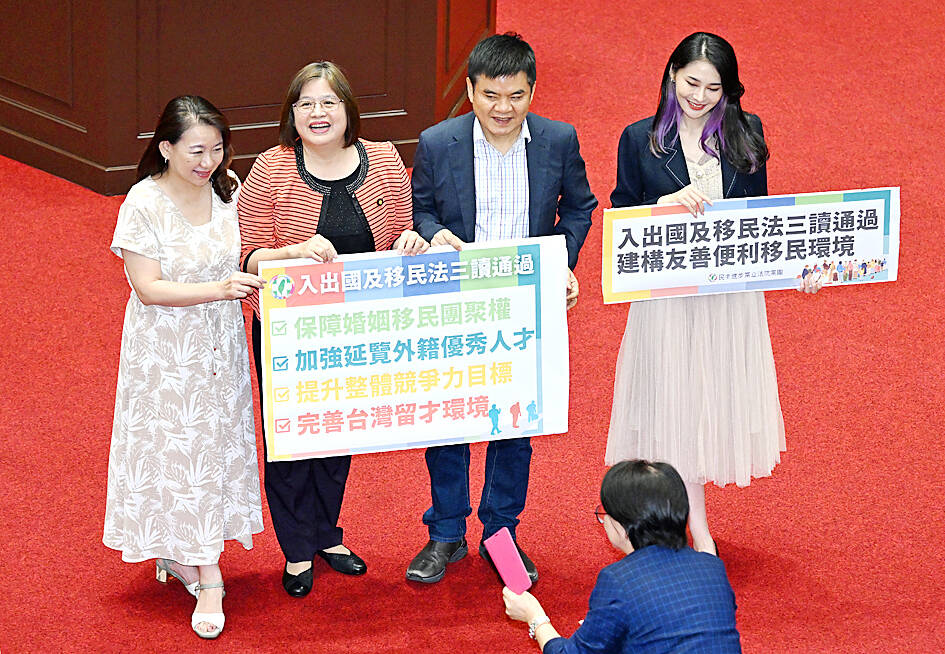Foreigners who are highly skilled professionals, top-prize winners in professional disciplines, investment immigration applicants or have made special contributions to Taiwan can soon apply for permanent residency on behalf of their spouses and minor or disabled children after the legislature approved amendments to the Immigration Act (入出國及移民法).
The amendments, which were proposed by the Ministry of the Interior and approved by the Executive Yuan on Jan. 12, aim to attract foreign talent to Taiwan and encourage them to stay.
They would take effect once they are signed by President Tsai Ing-wen (蔡英文).

Photo: Liao Chen-huei, Taipei Times
The amendments involved changing 63 articles, making it the biggest reform of immigration law in 24 years, Minister of the Interior Lin Yu-chang (林右昌) said.
The National Immigration Agency (NIA) in a statement identified four main policy changes.
First, the rights of families to reunify would be protected, taking into account the best interests of minor children, it said.
Foreigners whose Taiwanese spouses have died or who have divorced from legal residents of Taiwan would be able to apply for residency if they need to raise their underage children, the NIA said.
Second, regulations have been eased for foreigners to reside in Taiwan to attract more skilled professionals from overseas, it said.
Currently, foreigners who have secured permanent residency status are required to live in Taiwan for more than 183 days per year or lose their status.
However, the amendments would allow them to keep their status if they spent an average of 183 days in the country over the past five years, the NIA said.
White-collar workers would benefit from the policy change, as they often need to travel overseas for business and cannot remain in Taiwan for extended periods, the agency added.
The deadline for filing Alien Resident Certificate applications for the spouses or children of foreigners would be extended from 15 days upon entry to 30 days, the NIA said.
Third, fines for foreigners who overstay their visas and engage in illegal activities in Taiwan would be increased from between NT$2,000 and NT$10,000 (US$65 and US$326) to between NT$10,000 and NT$50,000, it said, adding that offenders would be barred from entering Taiwan for seven years.
To deter criminal activity by expatriates, people who shelter or hide foreigners who overstay their visas would be fined NT$60,000 to NT$300,000, while those who introduce foreigners to jobs or other activities that do not match their purpose of stay would be fined NT$200,000 to NT$1 million, the amendment says.
Finally, the amendments allow foreigners to be represented by immigration attorneys in hearings for forced evictions from the country and in their interviews with immigration officials.
The NIA can ban or restrict such requests if the presence of an attorney threatens national security and disrupts legal procedures, it said.

The CIA has a message for Chinese government officials worried about their place in Chinese President Xi Jinping’s (習近平) government: Come work with us. The agency released two Mandarin-language videos on social media on Thursday inviting disgruntled officials to contact the CIA. The recruitment videos posted on YouTube and X racked up more than 5 million views combined in their first day. The outreach comes as CIA Director John Ratcliffe has vowed to boost the agency’s use of intelligence from human sources and its focus on China, which has recently targeted US officials with its own espionage operations. The videos are “aimed at

STEADFAST FRIEND: The bills encourage increased Taiwan-US engagement and address China’s distortion of UN Resolution 2758 to isolate Taiwan internationally The Presidential Office yesterday thanked the US House of Representatives for unanimously passing two Taiwan-related bills highlighting its solid support for Taiwan’s democracy and global participation, and for deepening bilateral relations. One of the bills, the Taiwan Assurance Implementation Act, requires the US Department of State to periodically review its guidelines for engagement with Taiwan, and report to the US Congress on the guidelines and plans to lift self-imposed limitations on US-Taiwan engagement. The other bill is the Taiwan International Solidarity Act, which clarifies that UN Resolution 2758 does not address the issue of the representation of Taiwan or its people in

US Indo-Pacific Commander Admiral Samuel Paparo on Friday expressed concern over the rate at which China is diversifying its military exercises, the Financial Times (FT) reported on Saturday. “The rates of change on the depth and breadth of their exercises is the one non-linear effect that I’ve seen in the last year that wakes me up at night or keeps me up at night,” Paparo was quoted by FT as saying while attending the annual Sedona Forum at the McCain Institute in Arizona. Paparo also expressed concern over the speed with which China was expanding its military. While the US

SHIFT: Taiwan’s better-than-expected first-quarter GDP and signs of weakness in the US have driven global capital back to emerging markets, the central bank head said The central bank yesterday blamed market speculation for the steep rise in the local currency, and urged exporters and financial institutions to stay calm and stop panic sell-offs to avoid hurting their own profitability. The nation’s top monetary policymaker said that it would step in, if necessary, to maintain order and stability in the foreign exchange market. The remarks came as the NT dollar yesterday closed up NT$0.919 to NT$30.145 against the US dollar in Taipei trading, after rising as high as NT$29.59 in intraday trading. The local currency has surged 5.85 percent against the greenback over the past two sessions, central